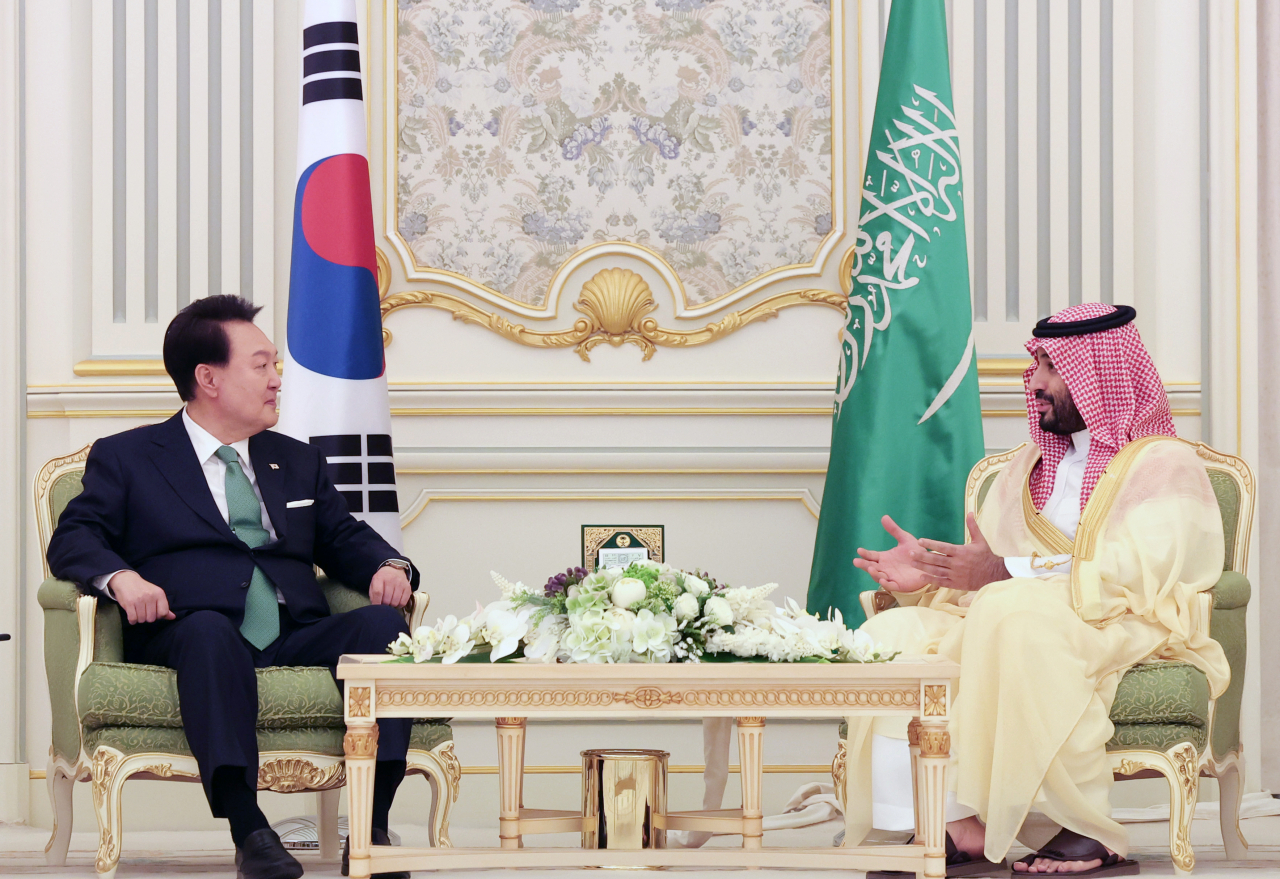 |
President Yoon Suk Yeol (left) and Saudi Crown Prince Mohammed bin Salman hold talks at the Palace of Yamamah in Riyadh, Saudi Arabia on Oct. 22. (Joint Press Corps) |
President Yoon Suk Yeol’s six-day trip to the Middle East, largely meant to expand economic ties, offers fresh momentum for South Korean companies to ride out global headwinds in the long-run, experts said Monday.
The state visit to Saudi Arabia has already led to a signing of deals including memorandums of understanding worth $15.6 billion in total, over areas ranging from food to oil to energy, according to Yoon’s office. He returns home Thursday after a one-day tour to Qatar the previous day.
The Saudi trip, the first-ever by a Korean leader, came as the desert kingdom is pushing ahead with establishing a futuristic, carbon-free city called Neom in the country’s northwestern Tabuk Province. Neom, spearheaded by Crown Prince Mohammed bin Salman, is the biggest project in his plan to diversify the oil-dependent economy.
“I’d say the timing on this is good,” said Choi Young-kil, a professor emeritus of Arab studies at Myongji University. “Saudi Arabia needs Korea’s tech know-how and Korea wants a foothold in the region. So it’s a win-win deal.”
Choi referred to the 1970s, when Korea had sent workers to the region to earn hard currency, like US dollars, to shore up the economy. At the time, Korea heavily invested in growing companies, laying groundwork for tech firms like Samsung Electronics, the world’s biggest memory chipmaker.
“Saudis have this perception that Koreans are hard-working, diligent people. Not only that, the leadership sees Korea as a model economy with a demonstrated history of a remarkable ascent from the ashes of the 1950-53 Korean War,” Choi noted.
Sung Il-kwang, head of research for Middles East politics and economics at Korea University’s Asiatic Research Institute, said uncertainties like a potential slowdown in China, Korea’s largest trade partner, warrants Seoul’s latest efforts to boost growth potential elsewhere.
“What matters more is, however, how Seoul and Riyadh would go about honoring the promises made now. Whether they are as determined to deliver on the deals as they say they are is what we should be closely looking at after the trip,” Sung said of continued commitment, which he described as a commodity in short supply when it comes to shaking hands on too many deals at once.
Choi Sang-mok, Yoon’s secretary for economic affairs, has said there is “some concrete progress like identifying projects” that have to do with at least 60 percent of the 29 billion deal inked in November last year, when Yoon and Prince Mohammed held talks during the prince’s trip to Korea. Cho, however, has yet to elaborate on what those projects are.
“This is just the kind of concern that I have,” said Park Hyun-do, a professor of Islamic studies at Sogang University’s Euro-MENA Institute. “Yoon officials have to be able to answer the tough questions, and that means showing the public what a follow-up or follow-ups look like.”







![[Weekender] Korea's traditional sauce culture gains global recognition](http://res.heraldm.com/phpwas/restmb_idxmake.php?idx=644&simg=/content/image/2024/11/21/20241121050153_0.jpg)